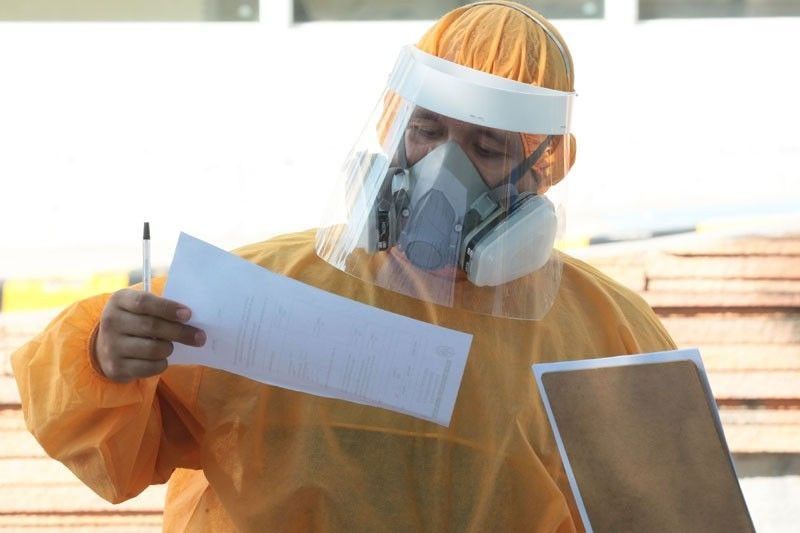COVID-19 positivity rate in NCR declining – OCTA

MANILA, Philippines — The number of people catching COVID-19 in Metro Manila is steadily declining, according to the latest report of the OCTA Research Group.
“The positivity rate for the NCR continues to trend in the right direction at six percent, which is now close to the WHO target of five percent,” the group said, referring to the National Capital Region and World Health Organization.
The average number of new cases in Metro Manila is 490 per day, it said.
The group, composed of researchers from the University of the Philippines, University of Santo Tomas and Providence College in the US, said the number of new cases in the Philippines also continues to decrease even as the Philippine Red Cross has resumed its testing.
The average number of new cases per day in the Philippines went down to around 1,800, a significant improvement from August’s 2,500.
Local government units (LGUs) identified by OCTA Research as high risk areas are Makati and Malabon in Metro Manila; Baguio City, Itogon and Tuba in Benguet; Lucena in Quezon; Iloilo City; Catarman in Northern Samar and Pagadian in Zamboanga del Sur.
On Wednesday, the Department of Health (DOH) recorded 987 new cases, bringing the total number of cases in the country to 388,137.
More than 90 percent of patients have recovered from the illness.
The OCTA Group warned of a possible “significant surge” in COVID-19 cases similar to the current outbreaks experienced in Europe and the US as the national government continues to reopen the economy.
It urged the national government to further increase the capacity of the national healthcare system as well as testing and contact tracing efforts.
The group sought to continue building more isolation facilities not just in the NCR but also in regions around the country, improve the system for coordination and sharing of medical and isolation facilities, as well as the capabilities of LGUs to implement public health programs.
“We urge the national and the local governments to strictly monitor and enforce compliance with minimum health standards such as physical distancing, wearing of face masks and face shields and proper hygiene to reverse the increase in transmissions at the community level,” it said.
Possible rise
Meanwhile, Health Undersecretary Maria Rosario warned of a possible rise in COVID cases when typhoon-affected laboratories resumed full operations.
Vergeire said the DOH is still checking if those laboratories have resumed full operations after the typhoon.
Aside from the laboratories, Vergeire said the typhoon affected some disease reporting units, where swabbing is also being done.
“Based on our initial reports, there are COVID-19 results from affected laboratories. It means they continued their operations. We will check if it’s at full capacity,” Vergeire said.
She reminded the public to continue observing minimum health protocols even at home to avoid spread of the virus.
Due to the weather disturbance, Vergeire said, people are staying home and this could lead to transmission of the infection if family members will not observe health protocols.
The DOH reported that additional 140 recoveries brought to 349,091 the number of those who overcame the infection.
There are 31,679 active cases, accounting for 8.2 percent of the total confirmed COVID cases. Most or 92.7 percent of the active cases are mild and asymptomatic.
COVID-related deaths went up to 7,367 with the inclusion of 49 fatalities.
The number of mortalities comprised 1.9 percent of total COVID cases.
Davao recorded the highest number of new cases with 136, followed by Iloilo with 67 and Quezon City, 47.
The DOH reported that 12 laboratories were unable to submit their data to the COVID-19 Data Repository System on Nov. 3.
425 cases in Bicol
The Bicol region has 425 active COVID-19 cases and the risk of transmission remains high, especially in evacuation centers, according to the United Nations’ office for coordination of humanitarian affairs (OCHA).
The UN humanitarian wing said relief efforts have been complicated by the coronavirus pandemic.
OCHA said about 361,000 people are sheltered in evacuation centers across the affected regions while another 54,400 are hosted by relatives and friends.
“Bicol’s main COVID-19 laboratory has also sustained damage, prompting the suspension of testing,” OCHA said.
The UN International Organization for Migration (IOM), one of the UN agencies involved in the response, warned that with the coronavirus pandemic, “the most vulnerable displaced populations have become even more vulnerable.”
“IOM will continue to work with our government partners to support their monumental recovery efforts to address the most urgent humanitarian needs,” said UN agency’s Chief of Mission in the Philippines, Kristin Dadey.
Emphasizing the critical need for proper COVID-19 precautionary measures in evacuation sites, IOM will deliver assorted personal protective equipment (PPE) including 200,000 face masks, 20,000 bottles of sanitizer, 2,000 face shields and 500 modular tents to the Department of Social Welfare and Development and the Philippine Coast Guard.
Authorities are also deploying personnel to monitor COVID-19 symptoms among the displaced.
Humanitarian teams are on the ground in some of the hardest hit areas, assessing damage.
Meanwhile, the UN Development Program (UNDP) provided provincial authorities in Albay with satellite imagery of affected areas.
The IOM deployed teams to Bicol and Calabarzon to assess the needs of displaced persons. It has also rolled out its guidelines on COVID-19 and camp coordination and camp management (CCCM) and protection.
The UN Food and Agriculture Organization will help assess the damage to agriculture as well as rehabilitation of agri facilities.
The UN Children’s Fund or UNICEF has pre-positioned water and sanitation items, tents for child-friendly spaces and education materials, which can be released to partners as needed. – Mayen Jaymalin, Rainier Allan Ronda, Pia Lee-Brago
- Latest
- Trending



























